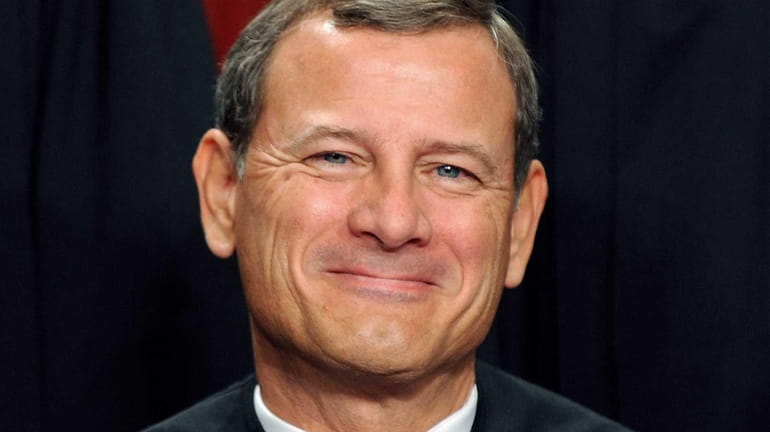Campbell: Chief Justice John Roberts is not a neutral umpire

Supreme Court Chief Justice John G. Roberts presided over Citizens United v Federal Election Commission, in which the court ruled 5-4 that regulating campaign contributions by corporate donors impinges on free speech. (Oct. 8, 2010) Credit: Getty Images
Chief Justice John Roberts is brilliant and quotable.
That doesn’t necessarily make him right.
Plenty of reports about his majority opinion upholding the constitutionality of the Affordable Care Act picked up this pithy gem: "It is not our job to protect the people from the consequences of their political choices."
It’s a terrific sound bite.
It sounds like judicial restraint - a good thing, especially if you’re a conservative who preaches such a "modest" approach to judging.
But it reminds me of his analogy about justices just being umpires calling balls and strikes neutrally, not swaying the outcome of the game.
Too simplistic, not an entirely accurate description of what they do and certainly not what happened here.
Yes, it’s a fine balancing act, but there are times when the court’s duty under the Constitution is to save us from misguided political choices.
In Loving v. Virginia (bit.ly/1zLYIm), the court said equal protection guarantees prohibit states from criminalizing interracial marriages, even though Virginia and 15 other states as recently as 1967 still did such an unjustifiable thing.
Decades earlier, in Pierce v. Society of Sisters (bit.ly/MGsIkw), the court in 1925 said that, even though states can require minors to attend school, Oregon couldn’t prevent parents from choosing a private school education for their children.
And then in Griswold v. Connecticut in 1965 (bit.ly/ztXSEm), the court said states can’t unduly intrude into married couples’ most intimate decisions about using contraception.
It’s not as though the Roberts court hasn’t on occasion decided it knows better than the people’s elected representatives. Citizens United v. FEC, anyone? That’s the 2010 ruling that gutted campaign finance limits crafted largely by Sens. John McCain, R-Ariz., and Russ Feingold, D-Ill., approved by Congress and signed into law by President George W. Bush.
If what Roberts meant with his language on the Affordable Care Act was that the court shouldn’t be striking down laws just because a bare majority of justices wouldn’t have voted for them had they been legislators, he’s absolutely right. His understanding of that could be a major reason Roberts broke with the other justices appointed by Republican presidents and wrote for the majority that the provisions of the healthcare law fall within Congress’s constitutional authority to levy taxes.
Roberts could hardly have made his dislike for the health insurance law plainer in NFIB v. Sebelius (bit.ly/M8yRq6).
"We do not consider whether the Act embodies sound policies. That judgment is entrusted to the Nation’s elected leaders," he wrote on page 2.
Then he expounded at length on how the law didn’t pass muster under the commerce clause because it would let Congress compel citizens to do just about anything, even - horrors! - to buy vegetables: "That is not the country the Framers of our Constitution envisioned," he wrote on page 23.
And as an exclamation point, he summed up with this on page 59: "The Framers created a Federal Government of limited powers, and assigned to this Court the duty of enforcing those limits. The Court does so today. But the Court does not express any opinion on the wisdom of the Affordable Care Act. Under the Constitution, that judgment is reserved to the people."
For his careful work, Roberts has been painted as everything from a liberal darling to a political genius to a turncoat to a sniveler who caved to The New York Times.
CBS News’ Jan Crawford even reported an account from unnamed inside sources saying Roberts had switched sides then resisted Justice Anthony Kennedy’s strenuous lobbying efforts to stay with the four other who really wanted to overturn the entire law. (cbsn.ws/KULhRr)
If justices used the cloak of journalistic anonymity to spin their version of events to their advantage, then they’re not only playing politics, they’re doing it ham-handedly and not nearly as well as the chief.
He appears to have shrewdly, strategically positioned to get his way: He deferred to congressional power to tax with one hand, but with the other laid the groundwork for constraining the regulation of interstate commerce. And that’s an open invitation to those who have long wanted to rein it in.
And that stuff about judicial modesty and letting the people decide?
Don’t look for it when the affirmative action case involving the University of Texas comes up next term.
Linda P. Campbell is a columnist and editorial writer for the Fort Worth Star-Telegram.
